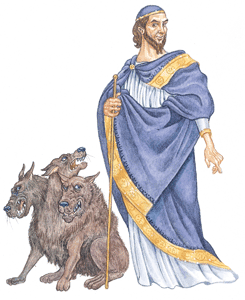Vote to Name the Newest Moons of Pluto
February 13, 2013
Astronomers with the SETI Institute, a research organization that searches for life in the universe beyond Earth, are giving the public a chance to help pick the names for the two newest moons discovered in orbit around Pluto. Now known as P4 and P5, the moons were found by astronomers at the institute in 2011 and 2012, respectively, using the Hubble Space Telescope (HST).
The ballot for the “Pluto Rocks” project includes 12 names from Greek and Roman mythology associated with the land of the dead, also known as Hades. Pluto was the god of the dead in Roman mythology. He was almost identical to Hades, the Greek god of the dead. The candidate names for the new moons include Cerberus, the three-headed dog that guarded the entrance to the underworld; Hercules, who descended into Hades to capture Cerberus and bring him back to the upper world; Persephone, a goddess who was kidnapped by Pluto (Hades); and Styx, the gloomy river in the underworld. Pluto’s other three moons are Charon, named for the ragged old boatman who ferried the shades (spirits) of the dead across the Styx or other rivers of the underworld; Hydra, a many-headed serpent that had its den at the entrance to Hades; and Nix, the goddess of the night.

Hades, the Greek god of the underworld--with Cerberus--was known as Pluto in Roman mythology. (World Book illustration by Pat and Robin Dewitt)
The ballot can be found on the Internet at http://plutorocks.seti.org. Voting ends at noon Eastern Standard Time on February 25, 2013. After the voting, the astronomers will pick two names to submit to the International Astronomical Union (IAU), which determines the names of celestial bodies. The IAU was expected to announce the new moons’ official names sometime this spring.
Pluto was discovered by Clyde W. Tombaugh in 1930, based on predictions by astronomer Percival Lowell in 1905. The name for Tombaugh’s planet was suggested by Venetia Phair, an 11-year-old British girl, to her grandfather, a librarian, who passed on the suggestion to an astronomer friend. The friend cabled the name to the Lowell Observatory in Flagstaff, Arizona, where Tombaugh worked. Long considered the ninth planet in the solar system, Pluto was “demoted” from planet to a new category of space object called dwarf planet after astronomers in the 1990′s found many objects similar to Pluto in the outer reaches of the solar system, in an area called the Kuiper belt.
Additional World Book articles:
- New Horizons
- Space exploration
- Exploring the Suburban Solar System (a special report)
- Astronomy 1930 (Back in Time article)
- Astronomy 1978 (Back in Time article)
- Astronomy 2006 (Back in Time article)
- Space exploration 2006 (Back in Time article)


